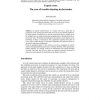Free Online Productivity Tools
i2Speak
i2Symbol
i2OCR
iTex2Img
iWeb2Print
iWeb2Shot
i2Type
iPdf2Split
iPdf2Merge
i2Bopomofo
i2Arabic
i2Style
i2Image
i2PDF
iLatex2Rtf
Sci2ools
109
click to vote
SAFECOMP
2000
Springer
2000
Springer
Expert Error: The Case of Trouble-Shooting in Electronics
An expert trouble-shooter is a subject who has a great deal of experience in his activity that allows him or her to be very efficient. However, the large amount of problems he or she has experienced tends to rigidify his or her strategies due to empirical learning and application of [symptom-fault] cooccurrence rules. We defend the hypothesis that experts' errors depend on the knowledge of these co-occurrences. Our experiment supported this point of view: expert trouble-shooters in electronics implement non-relevant actions in an atypical symptoms configuration. From an operational point of view, human is an active component of systems and the final dependability partly relies on human reliability. More specifically, human operators are strongly involved in maintenance and trouble-shooting activities. One then has to know about the cognitive processes involved in expert error and integrate this knowledge in the design of systems.
Atypical Symptoms Configuration | Expert Trouble-shooters | Implement Non-relevant Actions | SAFECOMP 2000 | Security Privacy |
| Added | 25 Aug 2010 |
| Updated | 25 Aug 2010 |
| Type | Conference |
| Year | 2000 |
| Where | SAFECOMP |
| Authors | Denis Besnard |
Comments (0)

